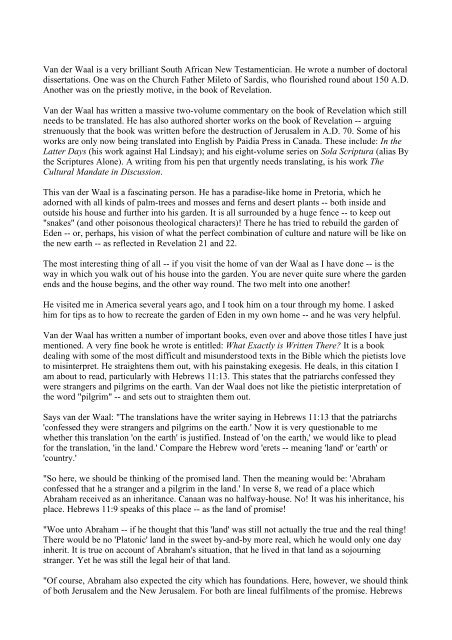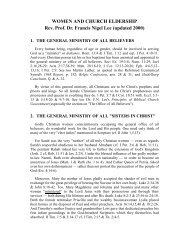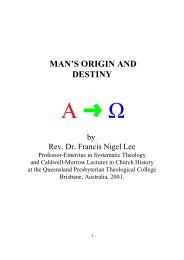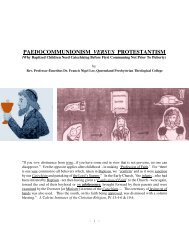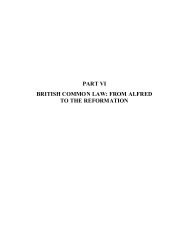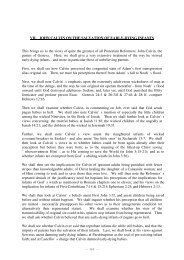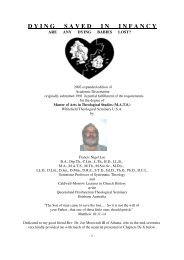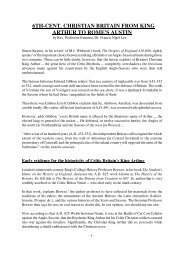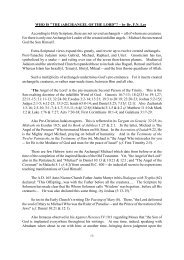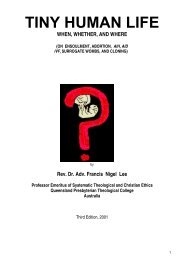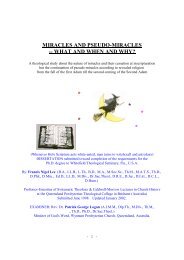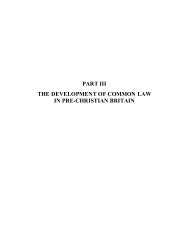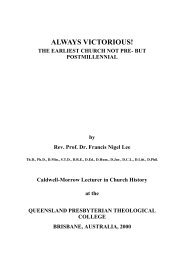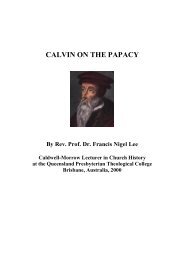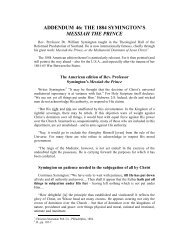I myself would add to what König is saying. For both passages are <strong>of</strong> Johannine authorship.<strong>The</strong>refore, they need to be taken together."John 12:31," says König, "follows on the request <strong>of</strong> the Greeks to see Jesus. Jesus reacts by sayingtwo things. First, Satan was then to be cast out <strong>of</strong> his dominion. John 12:31. Second, Jesus wouldthereupon draw all men unto Himself. John 12:32. This means that Satan is now being conqueredand bound, and that Jesus is now, by means <strong>of</strong> worldwide missions, turning all nations into Hisdisciples."This means, by Christ's actions <strong>of</strong> death and resurrection, that the power <strong>of</strong> Satan over the nationshas been broken. <strong>The</strong> house <strong>of</strong> Satan or the strong man's house -- that is, the world -- is now beingtaken over by the stronger man Christ. He executes this through His worldwide missions -- throughHis Church -- as pictured in Matthew 12:29!"In his doctoral dissertation Jesus Christ the Eschatos (alias the Last One), König tells us thefollowing: "<strong>The</strong> continued progress <strong>of</strong> the Kingdom throughout the world is indeed not anunpleasant surprise. To the contrary, it is one big pleasant surprise. Jesus was not just a Jewishapocalyptic who would have been satisfied if the end <strong>of</strong> the world had arrived immediately, and ifonly a handful <strong>of</strong> Jews would have been saved -- while God's judgments would have broken looseover all mankind. No!"In the first place, Jesus is the revelation <strong>of</strong> the God <strong>of</strong> love. First John 4:8 & 16. He is therevelation <strong>of</strong> the God Who so loved not just the Jews but the whole world, John 3:16. He is therevelation <strong>of</strong> the God Who sent His only Son not to condemn the world, but that the world throughHim might be saved. John 3:17. And this is why Jesus was called the Saviour <strong>of</strong> the world. John4:42, cf. First John 4:14 and First John 2:2."This Father and this Son do not just quietly supervise the arrival <strong>of</strong> the end as nothing more than adestructive condemnation <strong>of</strong> the human masses. No! This Father told this Son: 'It is a light thingthat Thou shouldest be My Servant to raise up only the tribes <strong>of</strong> Jacob, and to restore only thepreserved <strong>of</strong> Israel! I will give <strong>The</strong>e for a Light to the Gentiles -- so that Thou mayest be MySalvation unto the ends <strong>of</strong> the earth!' Isaiah 49:6."I now point briefly to a South African perhaps already known to you (because he writes inEnglish). I mean the Reformed Baptist from South Africa known as Erroll Hulse -- who has leftSouth Africa, settled in England, and become the leading Reformed Baptist in England (chieflythrough his books and well-known magazine "Reformation Today").I would like to give you a quote from his readable book <strong>The</strong> Restoration <strong>of</strong> Israel. Says Hulse,"Jesus reigns as king. He has an invincible purpose to redeem a great many from the nations <strong>of</strong> theearth. <strong>The</strong> universal kingship <strong>of</strong> Christ is far more prominent in Scripture, than the idea <strong>of</strong> defeatand apostasy. To the end <strong>of</strong> time -- believers have to face indwelling sin, persecution, tribulationand death. Yet the ultimate triumph <strong>of</strong> the believers is certain, and their triumph includes theproclamation <strong>of</strong> the Gospel on a vast scale -- to the salvation <strong>of</strong> an innumerable multitude."Now is a dark time. But the rains and harvest will come once more. <strong>The</strong> promises are ripe. <strong>The</strong>yawait fulfilment. Yes, in these last days it shall come to pass that the mountain <strong>of</strong> the Lord's houseshall be established in the top <strong>of</strong> the mountains and shall be exalted in the hills; and all nations shallflow unto it. Isaiah 2:2 and Micah 4:1f. Now we see the tiniest trickle. <strong>The</strong>n shall come the riverflowirresistible. Hallelujah!"Finally, I would like to close with a quotation from my friend Rev. Dr. Cornelius van der Waal.
Van der Waal is a very brilliant South African New Testamentician. He wrote a number <strong>of</strong> doctoraldissertations. One was on the Church Father Mileto <strong>of</strong> Sardis, who flourished round about 150 A.D.Another was on the priestly motive, in the book <strong>of</strong> Revelation.Van der Waal has written a massive two-volume commentary on the book <strong>of</strong> Revelation which stillneeds to be translated. He has also authored shorter works on the book <strong>of</strong> Revelation -- arguingstrenuously that the book was written before the destruction <strong>of</strong> Jerusalem in A.D. 70. Some <strong>of</strong> hisworks are only now being translated into English by Paidia Press in Canada. <strong>The</strong>se include: In theLatter Days (his work against Hal Lindsay); and his eight-volume series on Sola Scriptura (alias Bythe Scriptures Alone). A writing from his pen that urgently needs translating, is his work <strong>The</strong>Cultural Mandate in Discussion.This van der Waal is a fascinating person. He has a paradise-like home in Pretoria, which headorned with all kinds <strong>of</strong> palm-trees and mosses and ferns and desert plants -- both inside andoutside his house and further into his garden. It is all surrounded by a huge fence -- to keep out"snakes" (and other poisonous theological characters)! <strong>The</strong>re he has tried to rebuild the garden <strong>of</strong>Eden -- or, perhaps, his vision <strong>of</strong> what the perfect combination <strong>of</strong> culture and nature will be like onthe new earth -- as reflected in Revelation 21 and 22.<strong>The</strong> most interesting thing <strong>of</strong> all -- if you visit the home <strong>of</strong> van der Waal as I have done -- is theway in which you walk out <strong>of</strong> his house into the garden. You are never quite sure where the gardenends and the house begins, and the other way round. <strong>The</strong> two melt into one another!He visited me in America several years ago, and I took him on a tour through my home. I askedhim for tips as to how to recreate the garden <strong>of</strong> Eden in my own home -- and he was very helpful.Van der Waal has written a number <strong>of</strong> important books, even over and above those titles I have justmentioned. A very fine book he wrote is entitled: What Exactly is Written <strong>The</strong>re? It is a bookdealing with some <strong>of</strong> the most difficult and misunderstood texts in the Bible which the pietists loveto misinterpret. He straightens them out, with his painstaking exegesis. He deals, in this citation Iam about to read, particularly with Hebrews 11:13. This states that the patriarchs confessed theywere strangers and pilgrims on the earth. Van der Waal does not like the pietistic interpretation <strong>of</strong>the word "pilgrim" -- and sets out to straighten them out.Says van der Waal: "<strong>The</strong> translations have the writer saying in Hebrews 11:13 that the patriarchs'confessed they were strangers and pilgrims on the earth.' Now it is very questionable to mewhether this translation 'on the earth' is justified. Instead <strong>of</strong> 'on the earth,' we would like to pleadfor the translation, 'in the land.' Compare the Hebrew word 'erets -- meaning 'land' or 'earth' or'country.'"So here, we should be thinking <strong>of</strong> the promised land. <strong>The</strong>n the meaning would be: 'Abrahamconfessed that he a stranger and a pilgrim in the land.' In verse 8, we read <strong>of</strong> a place whichAbraham received as an inheritance. Canaan was no halfway-house. No! It was his inheritance, hisplace. Hebrews 11:9 speaks <strong>of</strong> this place -- as the land <strong>of</strong> promise!"Woe unto Abraham -- if he thought that this 'land' was still not actually the true and the real thing!<strong>The</strong>re would be no 'Platonic' land in the sweet by-and-by more real, which he would only one dayinherit. It is true on account <strong>of</strong> Abraham's situation, that he lived in that land as a sojourningstranger. Yet he was still the legal heir <strong>of</strong> that land."Of course, Abraham also expected the city which has foundations. Here, however, we should think<strong>of</strong> both Jerusalem and the New Jerusalem. For both are lineal fulfilments <strong>of</strong> the promise. Hebrews
- Page 1 and 2:
THE CHRISTIAN AFRIKANERSA Brief His
- Page 3 and 4:
God richly bless the following lect
- Page 5 and 6:
There have always been, and always
- Page 7 and 8:
But the only one they both appeal t
- Page 9 and 10:
Now Zuidema was a very great Dutch
- Page 11 and 12:
Dutch churches at the Synod of Dord
- Page 13 and 14:
station -- to help the Dutch ships
- Page 15 and 16:
It is a country dedicated to freedo
- Page 17 and 18:
1760 -- there was more and more dis
- Page 19 and 20:
with the Dutch. Many moved farther
- Page 21 and 22:
said: "The British have placed our
- Page 23 and 24:
financed by White money. It is buil
- Page 25 and 26:
Famous Boer Generals, left to right
- Page 27 and 28:
Three: Unannihilated: the Resurrect
- Page 29 and 30:
(who had arrived in the country onl
- Page 31 and 32:
of success.I may add that White Sou
- Page 33 and 34:
General Beyers felt that those text
- Page 35 and 36:
Balfour Declaration. The gist of it
- Page 37 and 38:
Africa; treks on into the land both
- Page 39 and 40: Four: The Eschatology of Victory in
- Page 41 and 42: ide -- to use the instrumentality o
- Page 43 and 44: Christian National Calvinist Public
- Page 45 and 46: through constitutional process it h
- Page 47 and 48: I guess the best way to describe Sm
- Page 49 and 50: He was followed after his assassina
- Page 51 and 52: So the Scots came. I am going to sp
- Page 53 and 54: the Reformed Church in South Africa
- Page 55 and 56: ook on Hebrews. But his greatest wr
- Page 57 and 58: At that point, Du Plessis enquired
- Page 59 and 60: Yet quite apart from this high view
- Page 61 and 62: One last point. There is a tremendo
- Page 63 and 64: African Republic in 1902, the Cape
- Page 65 and 66: One of the most important Calvinist
- Page 67 and 68: Pellissier, who wrote on music and
- Page 69 and 70: perspective -- even while he minist
- Page 71 and 72: ever encountered by the Whites in S
- Page 73 and 74: Now the United States does not need
- Page 75 and 76: majority of the White citizens are
- Page 77 and 78: Now you will not find in any of Sto
- Page 79 and 80: Finally, Stoker argues that the so-
- Page 81 and 82: This then brings Stoker to another
- Page 83 and 84: This Brummer just referred to, is a
- Page 85 and 86: Man was to rejoice in this nature (
- Page 87 and 88: enhanced. For, in the present, man
- Page 89: he declared, riddled with the ungod
- Page 93 and 94: World War II when he was hiding fro
- Page 95 and 96: The Professor of Philosophy -- or I
- Page 97 and 98: glory.There are also Christian psyc
- Page 99 and 100: Then there are Christian criminolog
- Page 101 and 102: Massachusetts at Gordon- Conwell fo
- Page 103 and 104: well known -- is being pioneered in
- Page 105 and 106: people in South Africa. The South A
- Page 107 and 108: nature and of human culture (Prover
- Page 109 and 110: The parousia of Jesus Christ will i
- Page 111 and 112: more and more christianised. Later
- Page 113: END


